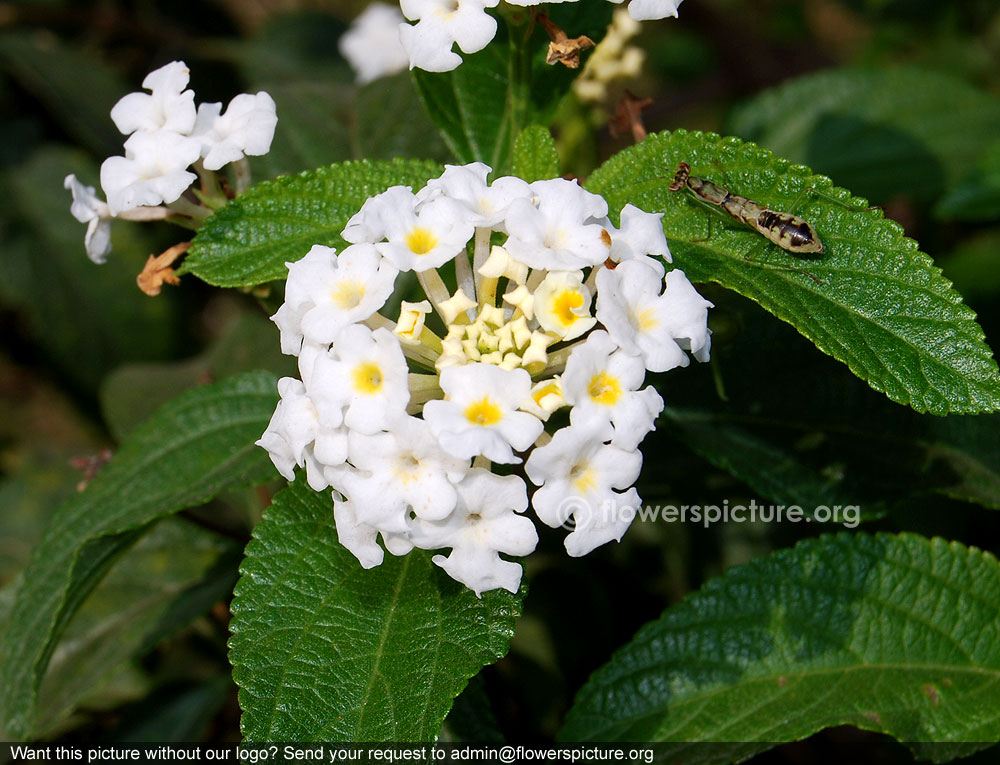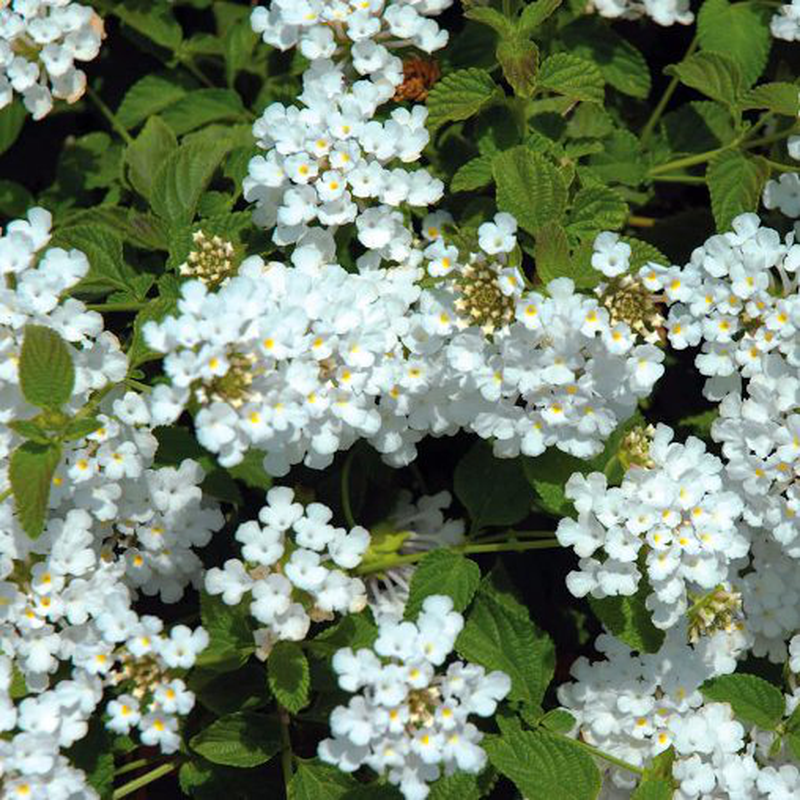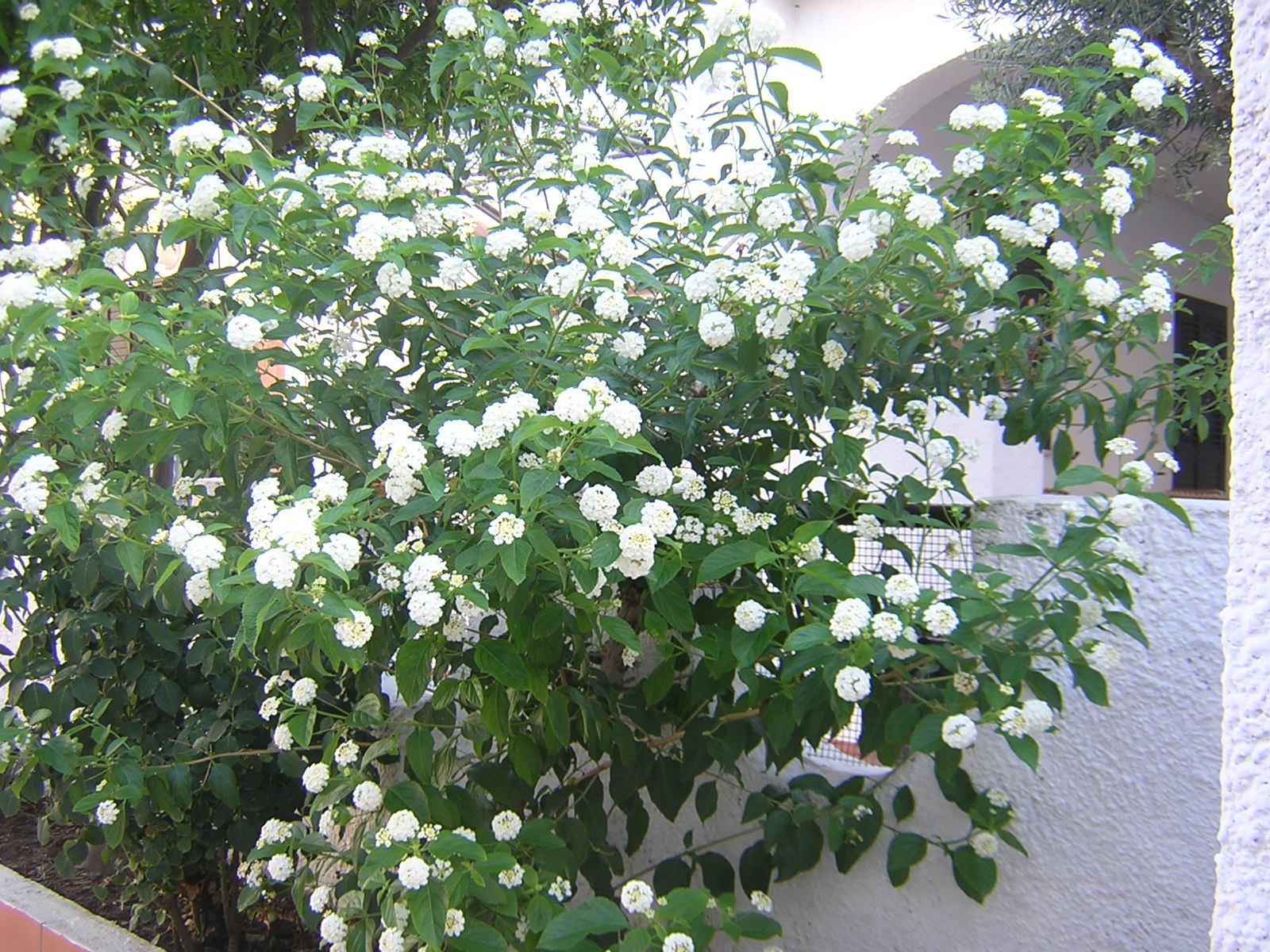
White lantana camara lantana camara bandana white
Lantana camara is a shrub that is not native to California. There is a high risk of this plant becoming invasive in California according to Cal-IPC. D J J J A S O N A F M M Bloom Period Photos on Calflora Toxicity: Do not eat the fruit of this plant. Wetlands: Occurs usually in non wetlands, occasionally in wetlands Name Status:

Lantana camara a photo on Flickriver
Simply choose a sunny location and plant them in well-draining soil. Although these plants are tolerant of many soil conditions, lantana flowers prefer slightly acidic soil. Mulching with pine needles is an easy way to increase acidity levels in the soil. Lantanas are planted in spring once the threat of cold weather and frost have ceased.

White Lantana Star Nursery Garden and Rock Centers
Vigorous, Lantana camara (Bigleaf Lantana) is a sun-loving evergreen shrub forming a large bushy mound of wrinkled, ovate, toothed, dark green leaves. The leaves are aromatic when bruised.

Lantana camara (fiore bianco) BotanicalDryGarden
Lantana camara is a perennial, erect sprawling or scandent, shrub which typically grows to around 2 metres ( 61⁄2 feet) tall and form dense thickets in a variety of environments. Under the right conditions, it can scramble up into trees and can grow to 6 m (20 ft) tall. [13] [14]

L'eleganza della Lantana bianca WoMoms®
7 December 2015 Lantana camara (lantana) Author: S. E Thomas Authors Info & Affiliations Publication: CABI Compendium https://doi.org/10.1079/cabicompendium.29771 Datasheet Types: Pest, Natural enemy, Invasive species, Host plant Abstract

FileLantana camara.jpg
Lantana camara, commonly known as lantana, is an attractive plant. It is a shrub that typically grows to around two metres tall, with multi-coloured flowers that are arranged in clusters around their stems. But lantana is also an invasive weed.

Lantana (Lantana camara Landmark™ White) in the Lantanas Database
It is easy to grow, and very low maintenance. It also comes in several attractive varieties. Last but not least, both the native and non-native species are pollinator-friendly. Bees and butterflies flock to the bright mounds of color. The most common lantana is a non-native species, Lantana camara.

Salvia Bianca (lantana Camara) Immagine Stock Immagine di fiore, nave
The non-native invasive Lantana ( Lantana camara/strigocamara) is usually most recognized by its clusters of bright orange, red, and yellow flower clusters. Many of the invasive lantanas end up within the environment or disrupting agriculture production. Sterile varieties can easily be found, but if you ever notice a Lantana camara produces.

JAVI27 Lantana camara blanca
Lantana camara, commonly called lantana or shrub verbena, is native to Central and South America. It is an upright frost-tender shrub that grows 3-6' tall. It has escaped gardens throughout the world and is considered to be a noxious weed in many frost-free/tropical areas where it can rapidly spread to form dense thickets.

Lantana camara
Lantana camara is a thorny shrub upright, half climbing or sometimes more or less hanging, reaching 2-3 m in height. The stems and branches are angular, bearing curved spines, arranged along the edges. The leaves are simple, opposite, decussate with rough lamina, oval, regularly dentate with acute apex..

Goccia Di Acqua Bianca Di Giallo Della Miscela Di Lantana Camara Sul
In areas where lantana is winter hardy but dies to the ground, pruning lantana stems in spring is vital to maintaining plant health. Cut stems back to 6 or 12 inches tall. After pruning lantana, water and fertilize to encourage new growth. When stems show 6 inches of new growth, remove the tips to promote branching, which leads to more flowers.

Lantana camara
Lantana is a genus (family Verbenaceae) of about 150 species of herbs, under shrubs and shrubs growing to 0.5-2 m tall. The genus Lantana, as described by Linnaeus in 1753 in Species Plantarum contains seven species, six from South America and one from Ethiopia (Munir, 1996 ).

Lantana sellowiana 'Bianca' Yougardener
Lantana camara, or simply just called lantana, was introduced to Florida in 1804 as an ornamental plant from the West Indies (MacDonald et al. 2008). This member of the Verbenaceae family is currently listed as a Category I by the Florida Exotic Pest Plant Council (MacDonald et al. 2008, Wunderlin and Hansen 2008).

Lantana camara
Lantana camara, a native plant from tropical America, is considered one of the most harmful invasive species worldwide. Several studies have identified potentially invasible areas under scenarios of global change, on the assumption that niche is conserved during the invasion process. Recent studies, however, suggest that many invasive plants do not conserve their niches.

lantane di calabria garden.it
Lantana camara is a thorny shrub upright, half climbing or sometimes more or less hanging, reaching 2-3 m in height. The stems and branches are angular, bearing curved spines, arranged along the edges. The leaves are simple, opposite, decussate with rough lamina, oval, regularly dentate with acute apex.

Pin on Flowerbed ideals
Lantana attract every kind of pollinator. Bees, butterflies and hummingbirds all love it. It is in bloom even late in the season when many other flowers are calling it quits. This longevity puts it into the top tier for supporting pollinators. Watch as the hummingbirds come calling when its clusters of tubular flowers are on display.